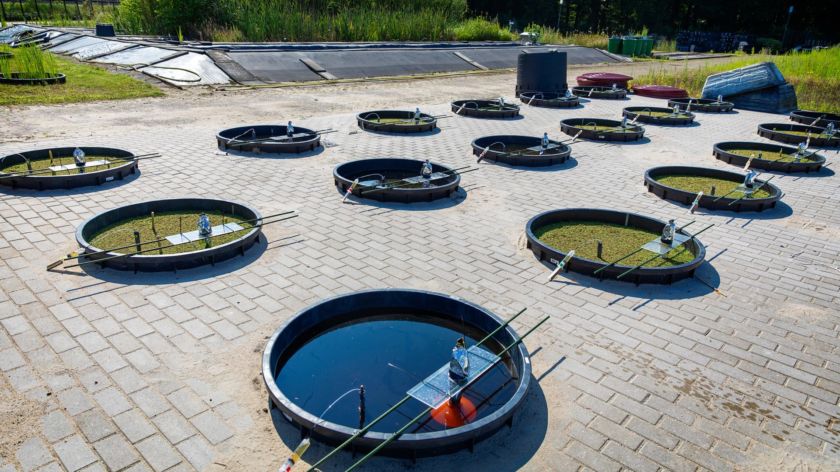Good climate news: methane emissions from lakes can be drastically reduced
-
 Miniatuurmeertjes waar de methaanuitstoot wordt gemeten. Foto: Dick van Aalst
Miniatuurmeertjes waar de methaanuitstoot wordt gemeten. Foto: Dick van Aalst
Half of all methane emissions don’t come from industry, but from bodies of freshwater, such as lakes and ponds. PhD candidate Tom Nijman has discovered two methods that can drastically reduce the greenhouse gas emissions from these places. But to make that discovery, he first had to ‘replicate’ the Wylerbergmeer.
In the summer of 2019, PhD candidate Tom Nijman could be seen lugging around buckets of mud behind the beta faculty. In front of him are 16 miniature lakes: round tubs with a 120cm diameter. They’re all simulations of the Wylerbergmeer, a recreational pond east of Nijmegen. ‘We used a massive pump on a boat to pump mud up from the lake, and I brought it to the faculty, using buckets to fill those 16 little lakes.’
The PhD candidate in aquatic ecology simulated the Wylerbergmeer to investigate how to reduce the methane emissions of bodies of freshwater. An important undertaking, because methane is the most important greenhouse gas next to CO2, and half of all methane emissions come from places like lakes and ponds. Nijman researched two methods for reducing those emissions and published the results in Science of the Total Environment last summer.
Choked with algae
‘Lakes and ponds naturally emit methane’, according to Nijman, ‘but humans also affect the rate of emissions.’ This starts with agriculture, causing more nitrogen and phosphates to wind up in lakes. ‘That makes lakes very rich in nutrients, causing organisms such as algae and blue-green algae to thrive. Those species block sunlight, causing underwater plants to die, which means they no longer produce oxygen; breaking down those dead plants also costs a lot of oxygen. Bacteria that produce methane work a lot harder in those kinds of oxygen-deprived environments, while bacteria that consume methane become far less effective.’
‘It’s a win-win. We get healthier lakes, and we reduce methane emissions’
More nitrogen and phosphates in a lake lead to more algae and blue-green algae, which in turn lead to more methane emissions. That’s not just bad for the environment, but also the ecosystem of the lake itself. Plants, insects, and fish thrive when the lake isn’t choked with algae. Humans themselves can also be affected, because blue-green algae are toxic, and it can make swimmers ill or cause skin conditions.
The flora in Nijman’s mini lakes proliferated as well. While he didn’t see any blue-green algae, the lakes’ surfaces did become covered by water ferns. ‘That led to the same oxygen deprivation effect, and thus increased methane emissions’, according to the researcher.
Huge boon
To solve those issues, Nijman decided to dredge some of the lakes. ‘This removes the top layer of the lakebed, which consists mostly of dead plant matter. That way, you reduce the nutrients in the lake, because breaking down plant matter would release nutrients into the water. The result is that algae can’t get enough food to cover the lake surface, which means methane-eating bacteria can do their jobs. And Nijman’s research shows that it’s a big job, too: dredging the lakes reduced their methane emissions by 52%.
The aquatic ecologist tried another solution in a few of the other lakes: he added Phoslock, a type of clay that’s been infused with the metal lanthanum. ‘Lanthanum binds to phosphates, eliminating it as a nutrient.’ That also reduces the number of algae, giving more space to the rest of the ecosystem – including methane-eating bacteria. Phoslock is not dangerous to the rest of the ecosystem; it doesn’t react to substances or living organisms other than phosphates.
This method proved even more effective than dredging. The clay particles lowered methane emissions by 74%. Good news, according to Nijman. ‘It’s a win-win. We get healthier lakes, and we reduce methane emissions.’
These two techniques won’t have large-scale applications for the foreseeable future; the experiments will first need to be replicated on a larger scale. But Nijman is cautiously optimistic. ‘If we can reduce methane emissions of freshwater bodies worldwide, that would be a huge boon for the climate.’
Translated by Jasper Pesch.




